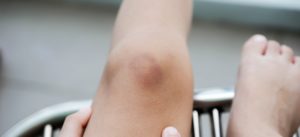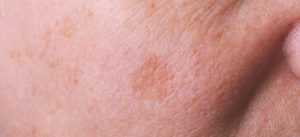Decoding the Messages: What Your Skin Reveals About Your Health
Discovering sudden skin issues can be incredibly bothersome and frustrating. Dealing with rashes, unexplained clusters of red bumps, or persistent acne can disrupt your day. However, it’s essential to recognize that your body isn’t causing these problems just for the sake of it. There are usually significant reasons behind these alerts, and it’s crucial to pay attention and listen. If you find yourself experiencing unexpected dryness, flakiness, or the appearance of peculiar-colored patches, it’s time to unveil the 30 hidden health secrets your skin is desperately trying to communicate to you.
Beneath the Surface: Unveiling 30 Clues Your Skin Reveals About Your Body
1. If you’re grappling with excessively dry and flaky skin and are perplexed about the cause, it could be a potential symptom of hypothyroidism. According to the Mayo Clinic, this condition arises when your thyroid gland fails to generate sufficient hormones. As a result, reduced sweat production ensues, altering the texture of your skin due to inadequate moisture retention.
2. Among the various symptoms associated with diabetes, skin problems often serve as early indicators of the disease, according to the American Diabetes Association. One notable manifestation to observe is the presence of firm, yellow bumps known as eruptive xanthomatosis. These bumps typically appear on the arms, legs, feet, hands, and buttocks.
3. Although people often make light-hearted remarks about developing dark circles due to insufficient sleep, the reality is that it can indeed occur. While the effects of chronic sleep deprivation may not be immediately apparent, over time, you may notice the emergence of a darker shade under your eyes, along with the potential development of premature wrinkles, as highlighted by the Cleveland Clinic. [21 Ways to Improve Sleep]
4. Engaging in frequent vocal conversations rather than text-based communication, and consistently keeping a phone in close proximity to your ear, raises the probability that your phone could be a significant factor contributing to your breakouts, particularly if you neglect to clean the screen on a regular basis. Regrettably, mobile devices harbor a substantial amount of bacteria. To mitigate the risk of transferring unnecessary bacteria onto the skin, it is imperative to diligently wipe down your device on a daily basis.
5. If you’ve been noticing the unwelcome arrival of wrinkles on your face earlier than expected, it’s possible that your fondness for sugary delights could be playing a part. According to the American Academy of Dermatology, diets rich in excessive sugar often accelerate the aging process. But fret not! It’s never too late to make a positive change. Consider letting go of this habit without delay and opt for the delightful sweetness of fresh fruits as a healthier treat alternative. Your skin will thank you in the long run!
6. Dealing with an uncomfortable and flaky scalp is certainly no picnic. But here’s an interesting insight: the culprit behind your seborrheic dermatitis might actually be linked to a nutritional deficiency. A study published in the Journal of Clinical and Investigative Dermatology suggests that insufficient levels of zinc, vitamin B6, vitamin B3, and vitamin B2 could contribute to this itchy skin condition. The good news is, you have the power to mitigate the problem and bring relief to your scalp. By addressing these nutritional gaps, you can embark on a journey towards a healthier and happier scalp.
7. Whether you recall the source of those mysterious bruises or not, your body’s tendency to bruise easily could be a gentle nudge signaling an underlying health concern. One of the most prevalent factors contributing to this issue is often a deficiency in either vitamin C or vitamin K. Dr. Andrew Weil, MD, explains that a scarcity of vitamin K is particularly likely if you’ve recently taken antibiotics that disrupt the microorganisms responsible for synthesizing this vital nutrient in the digestive tract. Meanwhile, a deficiency in vitamin C can also play a role. Vitamin C plays a crucial role in collagen synthesis and the fortification of other compounds that affect the resilience of our skin and blood vessels against the impacts that result in bruising. By addressing these deficiencies with care and incorporating sources rich in vitamin C and vitamin K into your diet, you can embark on a journey towards healthier and less bruise-prone skin. [How to Get Rid of Bruises]
signaling an underlying health concern. One of the most prevalent factors contributing to this issue is often a deficiency in either vitamin C or vitamin K. Dr. Andrew Weil, MD, explains that a scarcity of vitamin K is particularly likely if you’ve recently taken antibiotics that disrupt the microorganisms responsible for synthesizing this vital nutrient in the digestive tract. Meanwhile, a deficiency in vitamin C can also play a role. Vitamin C plays a crucial role in collagen synthesis and the fortification of other compounds that affect the resilience of our skin and blood vessels against the impacts that result in bruising. By addressing these deficiencies with care and incorporating sources rich in vitamin C and vitamin K into your diet, you can embark on a journey towards healthier and less bruise-prone skin. [How to Get Rid of Bruises]
8. Oh, those pesky varicose or spider veins! You know, those purple or blue bulging veins that make an appearance on our legs. Well, here’s the heartwarming truth: these veins are often an indication of circulatory issues, which can arise from changes in blood flow due to factors like age or pregnancy. But fret not! There’s a glimmer of hope. According to the Mayo Clinic, the key to bidding farewell to these veins lies in improving your circulation and enhancing muscle tone. By nurturing your circulation and engaging in activities that strengthen your muscles, you can embark on a journey towards minimizing the appearance and discomfort of these veins, giving your legs the love and care they deserve.
 9. Melasma, a skin condition characterized by the appearance of brown patches on the face, can pose challenges when it comes to effective treatment. The prevalence of melasma is higher among women compared to men, and it is commonly associated with hormonal changes, such as those experienced during pregnancy, the use of birth control pills, or hormone replacement therapy, as stated by the American Academy of Dermatology. Addressing melasma requires a professional approach, involving consultation with dermatologists who can provide expert guidance and recommend appropriate treatment options. While complete eradication of melasma may be challenging, professional interventions and diligent adherence to prescribed therapies can contribute to managing and improving the condition, helping individuals regain a more even and uniform complexion.
9. Melasma, a skin condition characterized by the appearance of brown patches on the face, can pose challenges when it comes to effective treatment. The prevalence of melasma is higher among women compared to men, and it is commonly associated with hormonal changes, such as those experienced during pregnancy, the use of birth control pills, or hormone replacement therapy, as stated by the American Academy of Dermatology. Addressing melasma requires a professional approach, involving consultation with dermatologists who can provide expert guidance and recommend appropriate treatment options. While complete eradication of melasma may be challenging, professional interventions and diligent adherence to prescribed therapies can contribute to managing and improving the condition, helping individuals regain a more even and uniform complexion.
10. Embrace the potential for transformation as we explore the enigmatic phenomenon of angular cheilitis, marked by delicate cracks in the corners of your mouth. Initially, one might attribute these fissures to mere dryness of the skin. However, a captivating revelation awaits: a 2007 study published in the esteemed journal Canadian Family Physician unveils the pivotal role of nutritional deficiencies, specifically insufficient iron or B vitamins, in the formation of this condition. Let this knowledge ignite the spark of inspiration within you, propelling you towards a journey of nourishment and vitality. By embracing a well-rounded approach to nutrition and incorporating enriching sources of iron and B vitamins into your diet, you can pave the way towards the restoration of a vibrant and resilient smile.
11. Embark on a transformative journey of self-care as we shed light on those intriguing bumps that grace the top of your thighs or the backs of your arms. These bumps, known as keratosis pilaris, may be beckoning you towards a simple solution: the incorporation of vitamin A into your daily life. Unlock the power of this essential nutrient by indulging in the vibrant hues of carrots, sweet potatoes, squash, cantaloupe, spinach, and kale. Nourish your body with these vitamin A-rich delights and watch as your skin radiates a newfound glow, embracing the smoothness and vibrancy you deserve.
12. Let’s have a real talk about the impact of food on the aging process. Sugar may not be the sole culprit here. Brace yourself for some truth bombs! Refined carbohydrates, those sneaky offenders found in white bread, white rice, and pastries made with white flour, can wreak havoc on your skin. How? Well, when you devour these delectables, your body rapidly breaks them down, causing your blood sugar to skyrocket. And guess what? The American Academy of Dermatology reveals that this blood sugar rollercoaster can leave its mark on your face, manifesting as those unwelcome premature wrinkles. So, it’s time to rethink our dietary choices and opt for nourishing alternatives that keep our blood sugar steady, helping us defy the aging process and maintain a youthful, radiant complexion.
13. Discovering red scaly patches on your skin might be an indication of psoriasis, a persistent immune-mediated disease frequently prompted by stress or colds. But wait, there’s more to the story. Dermatologist Dr. Kellie Reed reveals that psoriasis can also be linked to other health conditions, including diabetes, heart disease, abdominal obesity, and even depression. However, amidst this web of connections, there exists a secret and rather unusual cause that has recently piqued scientific interest. Recent research suggests a potential link between gut health and psoriasis, with imbalances in the gut microbiome potentially playing a role in triggering or exacerbating the condition. While more studies are needed to unravel this intriguing connection, it highlights the importance of holistic approaches to managing psoriasis, encompassing not just skin care but also considerations for overall well-being and gut health.
14. Let’s talk straight-up truth: we all love an occasional happy hour with friends, but let’s not make wine our nightly companion. Here’s the deal: alcohol is a seriously dehydrating beverage, and guess what? Your skin is one of its prime targets, according to the American Academy of Dermatology. As time goes by, this dehydration can wreak havoc, leaving you not just dry and lackluster but also adding a few extra years to your appearance. It’s a harsh reality we must face, my friend. So, let’s find that balance, indulge responsibly, and give our skin the love and hydration it deserves. Trust me, your future self will thank you for it!
15. In moments of stress, remember that it’s not just your mental well-being that takes a hit; your physical health is affected too. Stress, with its companions of muscle tension, fatigue, and sleep disturbances, can unveil an unwelcome guest on your face: pimples. But fret not, for understanding the science behind it can bring comfort. As dermatologist Dr. Kellie Reed explains, stress causes our adrenal gland to kick into overdrive, setting off a hormonal cascade that can lead to the emergence of more acne. So, in times of overwhelm, let’s find solace in the knowledge that this is a natural response, and by practicing self-care, managing stress levels, and seeking support, we can restore balance to both our minds and our skin. Remember, you are resilient, and this too shall pass.
17. When your eyelids take on a reddish or purple hue, it’s important not to dismiss it as a mere symptom of allergies. The American Academy of Dermatology warns that this issue could potentially be linked to dermatomyositis, an inflammatory muscle disease that occasionally presents a risk for various cancers, including ovarian cancer. It’s crucial to take note of these changes and seek medical attention for a thorough evaluation and appropriate diagnosis. Remember, early detection and timely intervention play a significant role in ensuring optimal health and well-being.
18. While scleroderma may be considered a rare autoimmune condition, it continues to impact the lives of thousands of individuals each year. One of the most striking symptoms associated with this condition is the hardening or tightening of the skin, attributed to the underlying swelling within the body, as highlighted by the American College of Rheumatology. Scleroderma manifests in various forms, affecting different parts of the body and potentially leading to complications in internal organs. Understanding the early signs and seeking medical attention can facilitate timely management and support, helping individuals navigate this challenging condition with the utmost care and support.
19. While residing in a bustling metropolis has its charms, it also carries certain drawbacks, particularly for your skin. The urban environment, brimming with pollution, can be a contributing factor to acne formation on your cheeks. Furthermore, an intriguing study published in the Journal of Investigative Dermatology back in 2010 shed light on another impact: individuals residing in areas with higher levels of air pollution exhibited more pronounced signs of skin aging, including the presence of pigment spots. This research serves as a reminder of the importance of protecting and nurturing our skin amidst the challenges of city living. By adopting a diligent skincare routine and taking proactive measures to shield our skin from environmental pollutants, we can strive for a healthy, radiant complexion that defies the negative effects of urban life.
20. The culprit behind the bothersome swelling or puffiness under your eyes can be attributed to various factors. However, one of the primary instigators can often be remedied through a simple solution: reducing your salt intake. The Mayo Clinic advises that by curbing your consumption of sodium, you can typically alleviate fluid retention, which is the underlying cause of this issue. Embracing a mindful approach to your dietary choices and opting for lower-sodium alternatives can help restore balance and bid farewell to the discomfort of eye puffiness. Remember, a small change in your habits can lead to significant improvements in your overall well-being.
21. We’ve all encountered peculiar marks on our skin at some point. However, if you happen to observe any changes in color, size, or shape in a specific mark, it’s crucial to take immediate action. Researchers from the University of Utah emphasize the importance of promptly consulting a medical professional. This transformation could potentially indicate skin cancer and early detection is key for a favorable outcome. By seeking medical attention without delay, you give yourself the best chance for effective diagnosis, treatment, and peace of mind. Remember, your well-being is of utmost importance, so trust your instincts and prioritize your health.20 Skin Cancer Symptoms Everyone Needs to Know.
22. When scaly red bumps make their appearance on your knuckles, it’s essential to consider the possibility of dermatomyositis—a condition known for causing muscle weakness and skin rashes due to inflammation. Regardless of your initial assessment, seeking medical attention from your doctor is crucial. Dermatologist Dr. Kellie Reed emphasizes the importance of this evaluation, as in rare cases, these bumps could serve as an indicator of cancer. By promptly consulting with your healthcare professional, you can ensure a comprehensive assessment and appropriate management, prioritizing both your peace of mind and your overall well-being. Remember, early detection and timely intervention can make all the difference in your journey toward optimal health.
23. Discovering the emergence of red bumps around your ankles, shins, and occasionally on your arms might be indicative of a connection to ulcerative colitis or Crohn’s disease. These bothersome bumps tend to manifest during an inflammatory bowel disease flare-up or even as a precursor to such flare-ups, as stated by the Crohn’s & Colitis Foundation. It’s crucial to recognize these signs and seek appropriate medical attention to address and manage the underlying conditions effectively. By staying vigilant and proactively addressing these symptoms, you can work towards achieving better overall health and well-being. Remember, understanding your body’s signals is an essential step on your journey to optimal wellness.
24. Don’t underestimate the significance of an itchy red rash; it’s important to delve into its underlying cause. The American Academy of Dermatology advises thorough investigation, as it is likely a case of contact dermatitis triggered by something irritating your skin. It could be anything from perfumes and body washes to the scents present in laundry detergents and more. By recognizing the potential culprits and taking proactive measures to address them, you can soothe your skin and find relief. Remember, understanding the triggers and making informed choices about the products you use is crucial for maintaining skin health and overall well-being.
25. One often overlooked underlying cause of eczema, a condition of red flaky patches on the skin, is a compromised skin barrier function. Factors like genetics, disruptions in the skin’s natural oils, exposure to irritants, and imbalances in the skin’s microbiome can weaken the skin’s protective barrier. This vulnerability makes the skin more prone to triggers, leading to dryness, inflammation, and itching. Proper skincare routines, moisturizing, avoiding irritants, and seeking professional guidance can help address this underlying cause and manage eczema effectively.
26. Vitiligo is a skin condition characterized by the loss of skin pigmentation, resulting in patches of depigmented or white skin. It occurs when the melanocytes, the cells responsible for producing melanin, are damaged or destroyed. People with vitiligo may have lower levels of vitamin D due to the impaired ability of their skin to produce this essential vitamin. Ensuring optimal vitamin D levels, either through safe sun exposure or under medical supervision, is vital for maintaining overall health and well-being.
27. Rosacea is a chronic skin condition characterized by facial redness, flushing, visible blood vessels, and sometimes small red bumps or pimples. It is associated with chronic inflammation in the skin and can be indicative of an underlying immune system imbalance or heightened sensitivity to triggers. To manage rosacea effectively, prioritizing immune health, managing stress, and adopting an anti-inflammatory lifestyle are recommended. This includes maintaining a balanced diet, engaging in regular exercise, and taking steps to reduce inflammation throughout the body.
28. Another factor that people might not commonly associate with wrinkles is prolonged exposure to blue light emitted by electronic devices, such as smartphones, tablets, and computers. Blue light can penetrate the skin and generate free radicals, which can contribute to skin damage and premature aging, including the development of wrinkles. Protecting the skin from blue light exposure by using screen filters, taking regular breaks from electronic devices, and considering skincare products with ingredients that provide antioxidant and blue light-blocking properties may help mitigate its potential effects on wrinkle formation.
29. Crepey skin, characterized by thin and wrinkled appearance, can be influenced by a deficiency in collagen-supporting vitamins, notably vitamin C. Insufficient vitamin C levels hinder collagen synthesis, leading to weakened skin structure and the development of fine lines and wrinkles. In addition to vitamin C, deficiencies in vitamin E, vitamin A, and omega-3 fatty acids can also contribute to crepey skin. Maintaining a well-balanced diet rich in these essential nutrients is crucial for supporting skin health and combating the signs of aging.
30. Lupus is an autoimmune disease that doesn’t shy away from affecting the skin. It can make a grand entrance with a butterfly-shaped rash on your cheeks and nose, known as a malar rash. But that’s not all it brings to the table—lupus can also throw in some photosensitivity, scaly patches called discoid lupus erythematosus, and even color changes in response to cold or stress, known as Raynaud’s phenomenon. When it comes to the skin, lupus doesn’t hold back, so it’s crucial to consult with a healthcare professional or dermatologist for proper evaluation and management.
Our skin is an incredible organ that can reveal valuable insights about our overall health. From conditions like eczema to acne, our skin serves as a canvas for both visible and hidden messages from within. By paying attention to these messages and seeking proper medical guidance, we can unlock the secrets our skin is trying to tell us. Whether it’s addressing underlying health concerns, prioritizing self-care, or making lifestyle adjustments, nurturing our skin health can lead to not only a more radiant complexion but also improved well-being. Remember, our skin is more than just a superficial facade; it’s a powerful messenger guiding us on our journey to holistic health.








